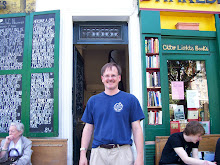Wednesday, February 14, 2007
Here are some themes we have discussed in class with reference to the
refranero
The Great Chain of Being. (La gran cadena del ser) This has to do with the idea that human behaviour can be explained by reference to "lower" elements of the chain. Proverbs about platns, animals, and inanimate objects are ultimately about people.
Literal and metaphorical meanings. There are proberbs about the weather than seem to mean exactly what they say: they are about the weather. On the other hand, a proverb about the weather might be about something else.
"It never rains but it pours." [Things happen in extreme ways. Nobody comes into the restaurant where you are working as a server until 6 p.m., but then 40 people come in at once. You might say "I never rains but it pours."
In Spanish: "llover sobre mojado" means something like "to add insult to injury," or "to rub salt in the wound." It means, literally, "to rain on already wet ground," but is used for situations in which an already bad situation gets worse, or there is simply "more of the same."
Pragmatic meaning
To understand a proverb we must understand the type of situation in which it might be used. Take the example of Más sabe el diablo por viejo que por diablo. It might be used when speaking of an older person who is particularly astute in his or her dealings. This is a more effective explanation than a more abstract statement about the devil.
refranero
The Great Chain of Being. (La gran cadena del ser) This has to do with the idea that human behaviour can be explained by reference to "lower" elements of the chain. Proverbs about platns, animals, and inanimate objects are ultimately about people.
Literal and metaphorical meanings. There are proberbs about the weather than seem to mean exactly what they say: they are about the weather. On the other hand, a proverb about the weather might be about something else.
"It never rains but it pours." [Things happen in extreme ways. Nobody comes into the restaurant where you are working as a server until 6 p.m., but then 40 people come in at once. You might say "I never rains but it pours."
In Spanish: "llover sobre mojado" means something like "to add insult to injury," or "to rub salt in the wound." It means, literally, "to rain on already wet ground," but is used for situations in which an already bad situation gets worse, or there is simply "more of the same."
Pragmatic meaning
To understand a proverb we must understand the type of situation in which it might be used. Take the example of Más sabe el diablo por viejo que por diablo. It might be used when speaking of an older person who is particularly astute in his or her dealings. This is a more effective explanation than a more abstract statement about the devil.
